_We may earn revenue from the products available on this page and participate in affiliate programs. Learn more ›
_
Best Portable
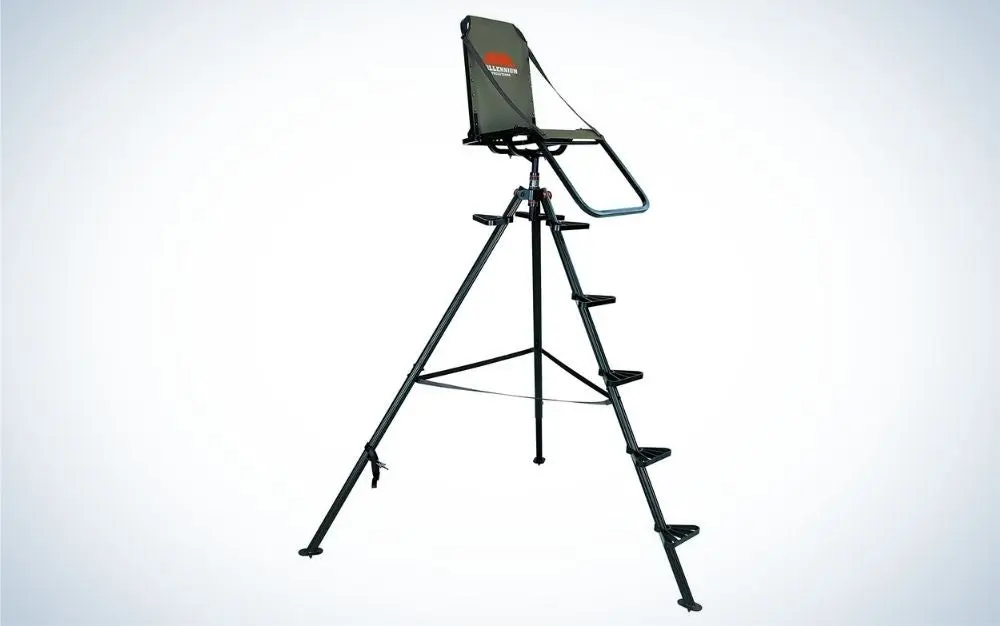
Millennium T-100 10 ft Aluminum Tripod
Best Two-Person
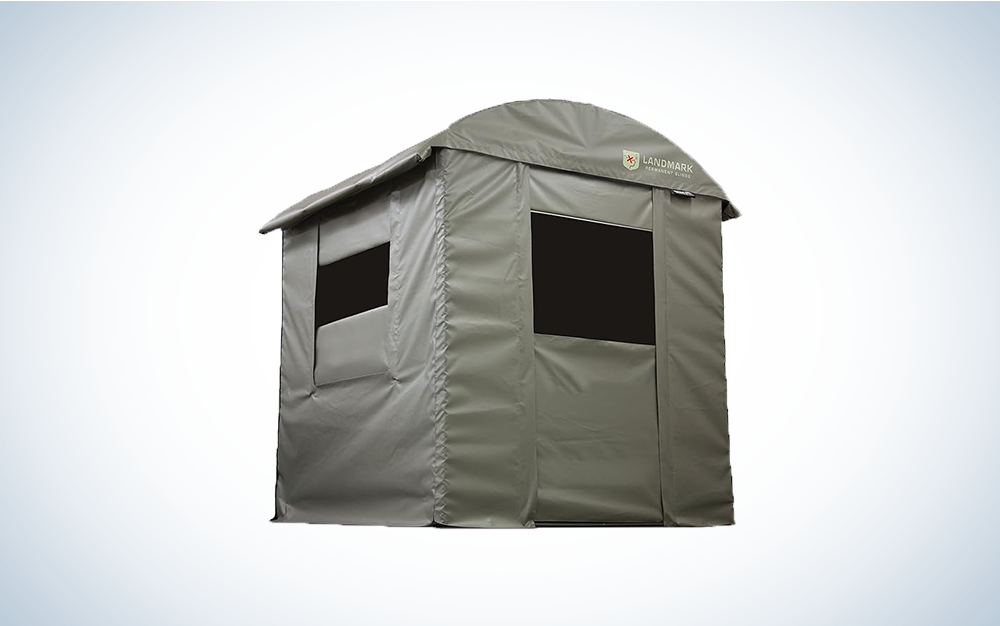
Rivers Edge Landmark 600 Permanent Blind w/10′ 600 Tower
Best for Rifle Hunters
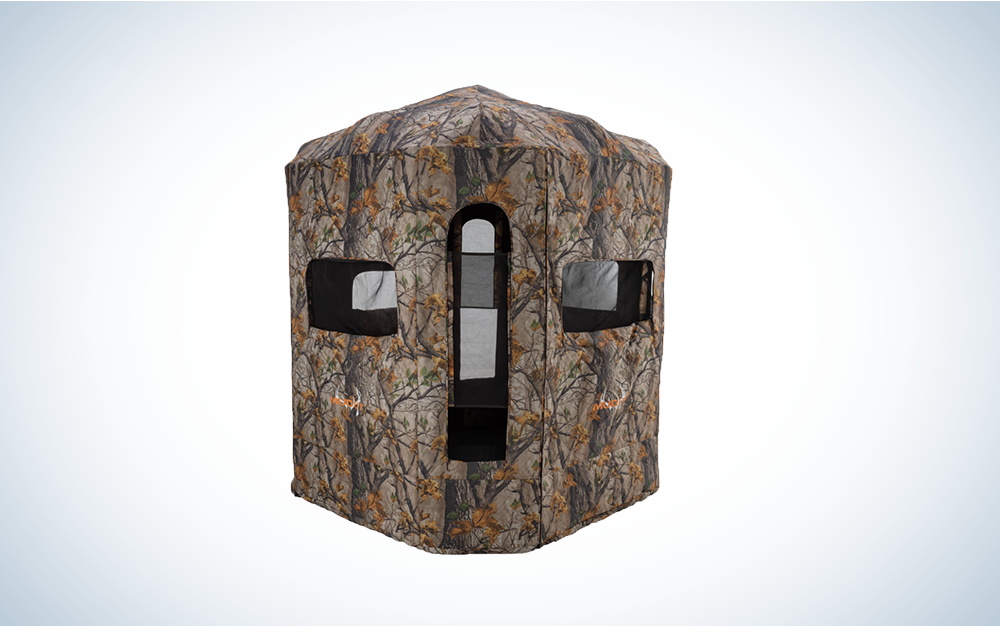
Muddy The Soft Side 360
Tripod deer stands feature three steel or aluminum legs that create a broad base leading to a narrow top where the seat is attached. They give hunters an elevated view, so many prefer them over ground blinds
where sight is restricted by vegetation or the landscape. A feeder is often placed nearby, allowing hunters to chase deer and other critters from virtually any location. That’s the great thing about a tripod—put it up where you want it, stick it in some cover, and hunt where the game is.
Many tripods are constructed from ultra-light materials that make transport and setup a breeze, while others are made with steel and meant to be left in one location for years. Some are fitted with La-Z-Boy-like seats and promise season after season of use. Many are between 10 and 12 feet tall. Here are some of the best tripod deer stands on the market so you can get in on the action.
Best Overall: Millennium Treestands T360 16ft Revolution
Best Portable: Millennium T-100 10-ft Aluminum Tripod
Best Two-Person: Rivers Edge Landmark 600 Permanent Blind w/10′ 600 Tower
Best for Bowhunting: Muddy The Liberty
Best for Rifle Hunters: Muddy The Soft Side 360
Best Budget: Guide Gear 12-ft Tripod Deer Stand
How We Picked the Best Tripod Deer Stands
Living out West, I will admit my tripod use is somewhat limited. However, each tripod mentioned in this article has been tested by yours truly or recommended by a whitetail fanatic.
There was a time when there were only four or five tripod stands on the market, limiting a hunter’s options. Today, many treestand makers offer at least one tripod. Some of the features most considered were durability, safety, comfort, ease of construction, and height and weight. Seats that swiveled were tested for noise, and I will note that tripods left out in the elements for years sounded like a rusty gate when the climbing system was used or when one’s butt shifted even slightly in the seat. Tripods that were cared for performed as advertised.
The Best Tripod Deer Stands: Reviews & Recommendations
Best Overall: Millennium Treestands T360 16ft Revolution
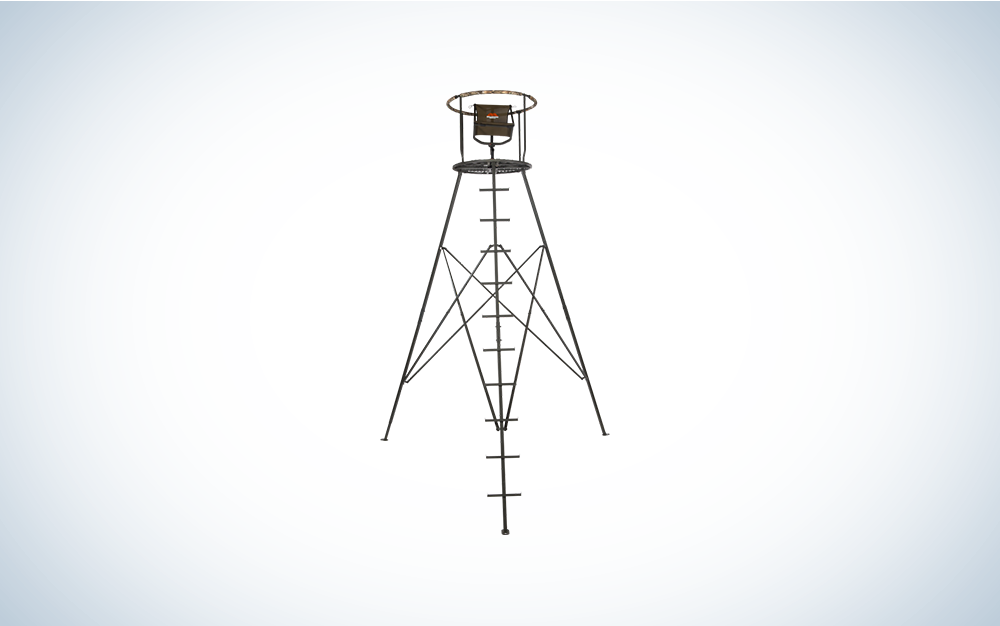
Specs
16′ to shooting rail
300-pound weight capacity
155.8 pounds total weight
Pros
Adjustable legs
360-degree swivel seat
Large ladder steps for stable footing
Cons
Not enclosed
An actual tripod that elevates the hunter and stands a true 16 feet to the shooting rail, the T360 16ft Revolution is worth its salt. The system weighs under 156 pounds, meaning a single person can set the tripod up. The 40″ x 16″ powder-coated steel platform is overly big, but it doesn’t make you feel like you are sitting on the edge of a cliff. We applaud the adjustable legs, which allow the tripod to sit sturdy on any terrain, and the Lift Up seat swivels silently 360 degrees.
We branded this tripod with our Best Overall label because it’s tall, highly functional, can be used by rifle and bow hunters, and it is comfortable. The ladder steps don’t feel like tiny pegs, and once your butt hits the seat, you feel ultra-stable. This is compliments of the powder-coated steel frame, stable crossbars, and the connection to the platform. The seat is as comfortable as they come, and because you can swivel 360 degrees, you’ll never miss that shot of a lifetime.
Best Portable: Millennium T-100 10 ft Aluminum Tripod
Best Portable

Specs
36 pounds
10 ft. high
Comfortable
Pros
Height
Lightweight and durable
Swivel seat
Fast setup
Cons
No shooting rest addition
Small platform
Pricey
Millennium designed the T-100 for those demanding a lightweight, easy-to-set-up model that will last for many seasons. I’ve used this easy-to-construct tripod for years, and you can’t beat its comfort and 360-degree swivel seat. The total stand weight is 36 pounds, and the setup time, if you read the owner’s manual, is less than a minute. The 10-foot height is perfect for backing the stand into the brush so the hunter can disappear in a vegetated backdrop. The four-foot extension
is handy for those areas where cover is sparse, and the hunter wants to gain extra elevation. If your primary goal is to bow hunt from this tripod, I recommend adding the extension. The frame is durable; the ComfortMAX seat lets you sit for hours in total comfort, and the seat’s 360-degree silent swivel allows you to take full advantage of your hunt area.
If you don’t abuse the tripod—leave it out in the elements year after year—it holds up well and stays quiet. But it will squeak if you leave the swivel seat out in the woods year after year. I like the footrest, and the powder-coat finish reduces game-spooking glare. The tripod is stable, and the steps are large and ensure sound footing even when hunting in damp conditions.
Best Two-Person: Rivers Edge Landmark 600 Permanent Blind w/10′ 600 Tower
Best Two-Person

Specs
All-weather blind construction
Rigid Steel Frame
Visibility enhancing stand addition
Pros
Marine Grade Synthetic Tarpaulin fabric
Quiet, sizeable windows
Hinged door for easy access and extra space
Cons
The platform is sold separately
Few things trump the enjoyment of hunting with family and friends, and the 72 x 72 inch 3-person Landmark 600 Permanent Blind offers comfort in spades. A blend of rigid steel and marine-grade reinforced synthetic tarpaulin allows this fortress to withstand the elements and be left outdoors for years. The sold-separately tower is durable and stable, and with adjustable horizontal windows and clip-on vertical panels, you can create custom openings for any hunt. The blind is suitable for all weapon types.
Best for Bowhunting: Muddy The Liberty
Best for Bowhunting
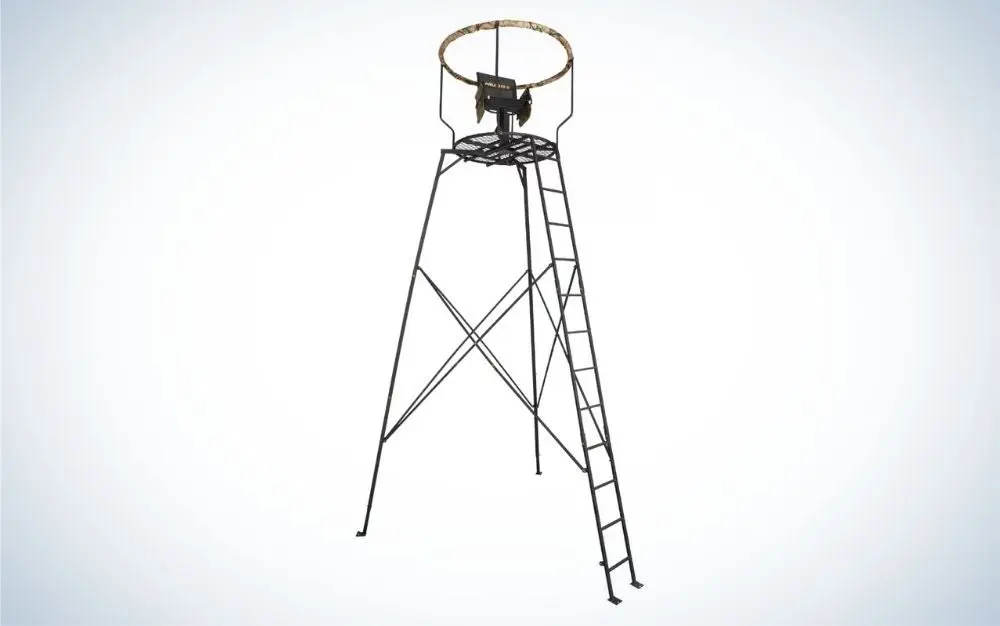
Specs
16-feet to shooting rail
42-inch diameter platform
Swivel seat
Pros
Platform
Comfortable swivel seat
Adjustable legs
Cons
Heavy
300-pound weight rating
Muddy’s The Liberty is weight rated for 300 pounds and has itself a finished weight of 134 pounds. This isn’t a run and gun tripod. But for bowhunters looking to hunt their favorite food plot, water source, and the like, this 16-foot-tall to the shooting rail tripod is a win. The adjustable legs make setting the stand on uneven terrain possible, and other features like the padded armrests, backseat cushion, and foam seat boost comfort.
At 42-inches in diameter, the steel platform is large enough to stand and walk on, and the shooting rail adds an element of safety and gives rifle and crossbow hunters a solid rest. Though, you can assemble the stand without the rail. The Liberty doesn’t require a NASA internship to construct, and the ladder-style entrance and exit reduce the chances of a slip or fall.
Best for Rifle Hunters: Muddy The Soft Side 360
Best for Rifle Hunters

Specs
Two platform options
Blind insulation
Powder-coated steel frame
Pros
Large, zippered door
Multiple windows
Silent sliding windows
Cons
Can’t leave out all year
Towers are not included with the blind
There has been a shift from tripods to four-legged blinds atop towers. Four legs instead of three means added stability when Mother Nature is at her worst. Muddy’s The Soft Side 360 is an 85″ x 72″ x 72″ hunting blind that fits Muddy’s Deluxe 5- and 10-foot towers. The insulated fabric walls and included floor pad retains the warmth rifle hunters need to withstand late-season Mercury drops, and the Silent Sliding Windows ensure absolute stealth.
The 5- and 10-foot Muddy Deluxe powder-coated steel frames are durable and light enough to move around any hunting property, making the Soft Side 360 w/Deluxe Tower a versatile choice. We like the insulation and the 360-degree shootability the blind offers. Rubber dampeners have been placed over the shooting rail, which provides a solid rest when the moment of truth arrives. The interior is ultra-dark, and like most enclosed blinds, The Muddy Soft Side 360 will help you fly under the olfactory system of deer.
Best Budget: Guide Gear 12-ft Tripod Deer Stand
Best Budget
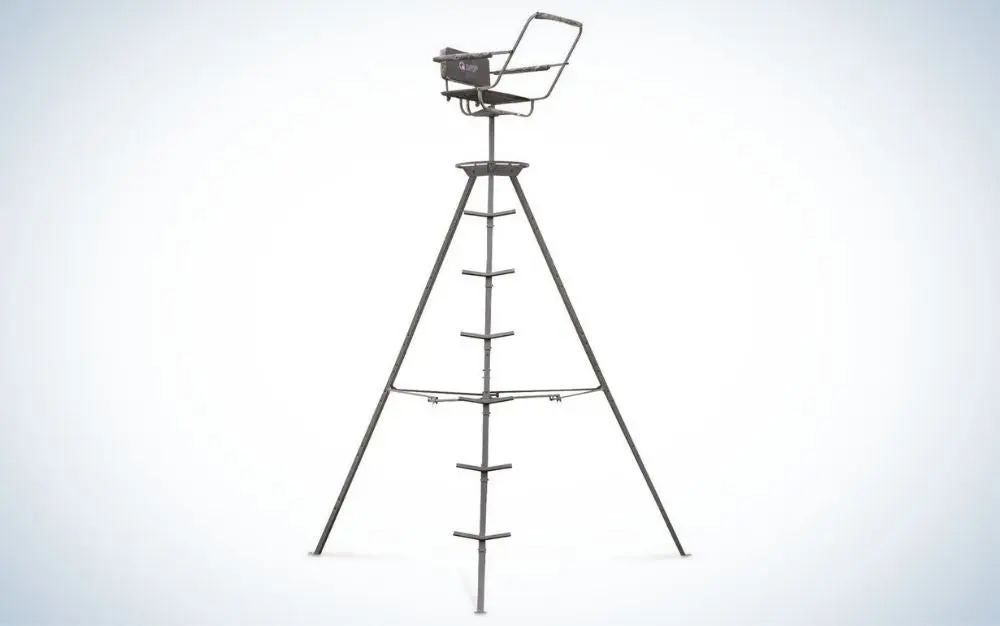
Specs
Three foldable legs
12-feet to shooting rail
66 pounds
Pros
Sturdy construction
Lightweight
Price
Cons
Small platform
No ladder only steps
One of the most popular tripod stands on the market, Guide Gear’s 12-ft Tripod Deer Stand has a wallet-pleasing price point and ensures easy setup. The stand is lightweight and portable, weighing 66 pounds and featuring collapsible legs. The simplicity of the setup is terrific: You can fold this tripod down, toss it over your shoulder, and move it where you want without machinery or human assistance.
The seat showcases a thick backrest cushion and comfortable Flex-Core cushioned seat pad. The chair will swivel a full 360 degrees. The 20-inch diameter footrest is small, and while you can stand and shoot in this stand, you’ll want to be very careful. The tripod is fitted with a stationary padded shooting rail and armrests.
What to Consider When Choosing a Tripod Deer Stand
Terrain
If your very best deer spots have trees that will hold a lock-on, climber (here’s our roundup of the best climbing stands
), or ladder stand, you don’t need to worry about the best tripod deer stands. Just hunt in the tree stand of your choosing.
The nock on tripods is they limit how high you can get. When hunting white-tailed deer, most hunters—gun and bow—prefer to be 18 feet up where movement is less likely to be spotted. Many deer hunters like to be higher in a tree for wind purposes—thinking the higher they are, the better chances their human stink will blow out and over approaching deer.
You need a tripod or 10 if you love to hunt from an elevated position and don’t live in an area with suitable treestand trees. If you want to climb and hunt, but the thickest trunk in your woods is two inches in diameter, a tripod is your only option.
There are those hunt locales loaded with piles of great tree stand trees, but if there isn’t one overlooking your favorite food plot, fence gap, waterhole, etc., and you don’t want to hunt from a hub-style ground blind, you need a tripod stand. Here are the criteria for determining what will be the best tripod deer stand for yourself.
Hunting Style
You’ll also need to match the style of the tripod stand to your hunt situation. For instance, if you’re carrying the tripod without the use of equipment for any significant distance and know that you’ll likely move the stand from spot to spot, total tripod weight should be high on your list of things to consider.
You’ll want a shooting rail for support if you’re shooting a rifle or crossbow from the tripod. If you’re toting a vertical bow, you want to make sure you can draw and shoot from sitting and standing positions and some tripods make this more straightforward than others.
Comfort
It would help if you also considered comfort. The more time you spend in the woods, the better your chances of filling the freezer. It’s a cliche saying, but so very true. It’s hard to stay in the woods if your legs and back are going to sleep. Remember, you’ll spend 90 percent of your time sitting when hunting from a tripod. Seat and platform build are essential. Spending so much time on your butt means having a tripod with a swiveling seat that doesn’t creak and squeak when you move in it.
Number of Hunters
You’ll also want to consider if there’s a chance another hunter will be joining you from time to time, or you might be putting the tripod up so you can sit with a young hunter. Plenty of tripods allow two hunters to sit together side by side, and this is one area of the tripod market that is growing.
FAQs
Q: How much do tripod deer stands cost?
There are Ford Pintos and there are Teslas in the tripod world. If you own or lease your deer property, it’s a good idea to spend a little extra coin and get stands that are sturdy, get you off the ground, promise longevity, and ensure comfort. If you like to hunt with a spouse, kid, or buddy, go the double tripod route. The more amenities a tripod stand has, the more it will cost.
If you own or lease deer ground loaded with lots of stand trees and are looking to set a few tripods in locales where there isn’t a good tree option and plan to leave those tripods out year after year, go with a more straightforward stand that is built tough but lacks bells and whistles.
Q: How much weight can a tripod deer stand hold?
Most are rated at 300 pounds, which seems a bit low, but that weight rating is the norm. The main exception to that rule is two-person tripod stands. These stands typically have a max in-stand weight of between 500 and 600 pounds.
Q: Are tripod deer stands safe?
Some hunters will attach a lifeline to the tripod, and this will work if the tripod is anchored correctly. Tripod stands built with ladders for entrance and exit boost safety, as most tripod falls happen during ascents and descents. Something else to keep in mind is platform size — a tripod with a larger platform will be a safer option.
Q: How do I anchor a tripod stand?
You can adjust most tripod legs independently to compensate for uneven ground. However, the more even ground you can find, the better. Some stands also have a wider leg angle, creating a broader base, creating stability. A few stands I’ve seen have been anchored with large stakes — homemade jobs mostly — but some will come with earth anchors that drive into the ground and attach to the stand’s base via a cable and turnbuckle system.
Q: How do I hide a tripod deer stand?
In many locations, hunters don’t try to hide tripod deer stands. They use feeders to take the attention off the hunter in the stand, but deer get wise to this. When possible, always try to tuck your stand in tall brush or a section of lesser-sized trees that won’t accommodate a regular tree stand but will break up your human outline.
Q: Can deer see me in a tripod stand?
Deer can see you on an elevated stand if you create unnecessary movement or noise. Tripod stands, especially if the stand has not been placed in cover, make it easier for deer to spot the hunter due to the hunter’s distance (10-14 feet) off the ground. Movement must be kept to a minimum when hunting from a tripod stand.
Best Tripod Deer Stands: Final Thoughts
Best Overall: Millennium Treestands T360 16ft Revolution
Best Portable: Millennium T-100 10-ft Aluminum Tripod
Best Two-Person: Rivers Edge Landmark 600 Permanent Blind w/10′ 600 Tower
Best for Bowhunting: Muddy The Liberty
Best for Rifle Hunters: Muddy The Soft Side 360
Best Budget: Guide Gear 12-ft Tripod Deer Stand
I’m not going to tell you tripod stands are the bee’s knees of the treestand world. I would much rather be in a lock-on treestand 20-feet up a hardwood, but that is not always an option. Tripod stands are must-have items for deer hunters
who hunt terrain void of trees capable of holding a lock-on, ladder, or climber stand. When hunting this type of terrain, common in Texas and parts of Oklahoma, the use of a feeder is often a must, and it’s essential to blend the tripod into natural cover.
I also like the tripod for outside-the-box whitetail moments like what I mentioned earlier in this article. Without that tripod, I would have never killed that 8-point. If you hunt the West, Midwest, or East — locales where tripods aren’t often used — don’t be afraid to give one a go. The best tripod deer stands work exceptionally well for rifle hunting over food plots, water sources, and the like. And if disguised carefully, they will work for bowhunting in these locations.
Why Trust Us
For more than 125 years, Field & Stream has been providing readers with honest and authentic coverage of outdoor gear. Our writers and editors eat, sleep, and breathe the outdoors, and that passion comes through in our product reviews. You can count on F&S to keep you up to date on the best new gear. And when we write about a product—whether it’s a bass lure or a backpack—we cover the good and the bad, so you know exactly what to expect before you decide to make a purchase.






